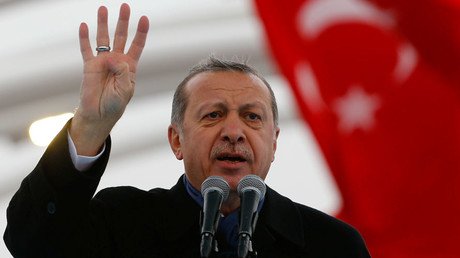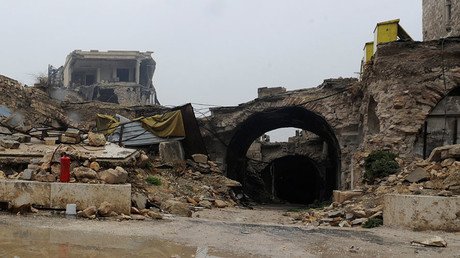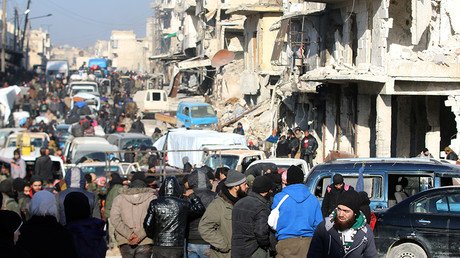Russia & Turkey agree on nationwide Syrian ceasefire plan – Ankara
Russia and Turkey have reached an agreement on a plan that would involve a ceasefire between the Syrian governmental forces and the opposition armed groups on a nationwide scale, Turkey's foreign minister said.
The minister, Mevlut Cavusoglu, said that the two countries have come to an agreement on the ceasefire issue and even prepared a text of the truce accord to be presented to the warring parties.
"There are two texts ready on a solution in Syria. One is about a political resolution and the other is about a ceasefire. They can be implemented any time," Cavusoglu told reporters on the sidelines of an awards ceremony at the presidential palace in Ankara, as cited by Reuters.
A source in the Russian Foreign Ministry also confirmed the existence of the agreement to Gazeta.ru.
However, Russian presidential spokesman Dmitry Peskov declined to comment on the agreement reportedly reached by Moscow and Ankara. “I cannot answer this question now, I do not have sufficient information right now,” he said, in reply to a question about the agreement, as cited by TASS.
However, he confirmed that Russia and Turkey are engaged in a “constant” discussion in Astana of the possibilities of talks between the various sides in the Syrian conflict.
The ceasefire plan is expected to be implemented in all areas where the Syrian Army is engaged in a fight with the armed opposition and will come into force as early as midnight on Wednesday, December 28, (22:00 GMT), Turkish state Anadolu news agency reported earlier, citing an unidentified Turkish state official.
The agreement does not include terrorist organizations such as Al Nusra Front and Islamic State (IS, former ISIS/ISIL), which would not be part of the deal, Anadolu says. A source close to the Russian Foreign Ministry told Gazeta.ru that Kurdish militia units known as YPG are also excluded from the ceasefire.
If the ceasefire is successfully implemented and upheld, negotiations between the Syrian government and opposition will start in the Kazakh capital, Astana, in early 2017, the news agency added.
The talks would not include the United States and are expected to be separate from the UN-brokered negotiations that were held in Geneva several times but failed to bring any significant results.
Meanwhile, a representative of one of the opposition factions told Reuters that no agreement on a ceasefire had been reached with the opposition yet. "The details of the ceasefire deal have yet to be officially presented to the factions," he said.
A Saudi-backed Syrian opposition group said it knew nothing of the negotiations, but supported a ceasefire.
UN Special Envoy for Syria Staffan de Mistura welcomed the efforts by Moscow, Ankara and Tehran to establish a nationwide ceasefire in Syria and launch a meaningful political dialogue between various sides of the Syrian conflict, the Russian Foreign Ministry said in a statement.
Russia, Iran and Turkey said last week they were ready to help broker a peace deal after holding talks in Moscow, where they adopted a declaration setting out the principles any agreement should adhere to.
The declaration was passed by the three countries during the negotiations in Moscow on December 20.
Russian Foreign Minister Sergey Lavrov said that Moscow, Tehran and Ankara have come up with a document that aims to improve the situation in war-torn Syria. These measures are intended to help bring about “the revival of the political process to end the Syrian conflict,” he said.
At that time, Cavusoglu also mentioned the necessity of implementing a ceasefire in all parts of Syria. “Today we are talking about the ceasefire, and the ceasefire should be in all Syria,” he said, adding this shouldn’t apply to attacks on terrorist groups such as Islamic State or Al-Nusra Front.
The declaration was also approved by the respective defense ministers. The approval of the declaration at the level of defense and foreign ministers shows a willingness to “act as guarantors and jointly resolve the urgent issues of the Syrian crisis,” Russian Defense Minister Sergey Shoigu said at that time, commenting on the issue.















